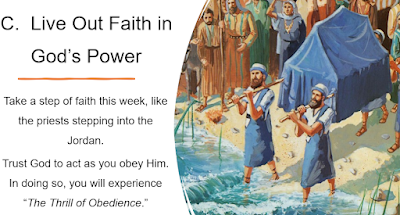Stand Alone Lesson
This lesson explores the Israelites'
miraculous crossing of the Jordan River under Joshua's leadership, emphasizing
God's faithfulness, His power in overcoming impossible obstacles, and the
importance of remembering His works. We’ll see how this passage foreshadows
salvation through Christ and invites us to live with faith and worshipful
remembrance.
How has your walk with God been this year?
What needs to change for you in 2025?
Let's read our Scripture for this lesson:
Joshua 3:7-4:24
7 And the Lord said to Joshua, “Today I will
begin to exalt you in the eyes of all Israel, so they may know that I am with
you as I was with Moses. 8 Tell the priests who carry the ark of the covenant:
‘When you reach the edge of the Jordan’s waters, go and stand in the river.’”
9 Joshua said to the Israelites, “Come here
and listen to the words of the Lord your God. 10 This is how you will know that
the living God is among you and that he will certainly drive out before you the
Canaanites, Hittites, Hivites, Perizzites, Girgashites, Amorites and Jebusites.
11 See, the ark of the covenant of the Lord of all the earth will go into the
Jordan ahead of you. 12 Now then, choose twelve men from the tribes of Israel,
one from each tribe. 13 And as soon as the priests who carry the ark of the
Lord — the Lord of all the earth — set foot in the Jordan, its waters flowing
downstream will be cut off and stand up in a heap.”
14 So when the people broke camp to cross the
Jordan, the priests carrying the ark of the covenant went ahead of them. 15 Now
the Jordan is at flood stage all during harvest. Yet as soon as the priests who
carried the ark reached the Jordan and their feet touched the water’s edge, 16
the water from upstream stopped flowing. It piled up in a heap a great distance
away, at a town called Adam in the vicinity of Zarethan, while the water
flowing down to the Sea of the Arabah (that is, the Dead Sea) was completely
cut off. So the people crossed over opposite Jericho. 17 The priests who
carried the ark of the covenant of the Lord stopped in the middle of the Jordan
and stood on dry ground, while all Israel passed by until the whole nation had
completed the crossing on dry ground.
4:1 When the whole nation had finished
crossing the Jordan, the Lord said to Joshua, 2 “Choose twelve men from among
the people, one from each tribe, 3 and tell them to take up twelve stones from
the middle of the Jordan, from right where the priests are standing, and carry
them over with you and put them down at the place where you stay tonight.”
4 So Joshua called together the twelve men he
had appointed from the Israelites, one from each tribe, 5 and said to them, “Go
over before the ark of the Lord your God into the middle of the Jordan. Each of
you is to take up a stone on his shoulder, according to the number of the
tribes of the Israelites, 6 to serve as a sign among you. In the future, when
your children ask you, ‘What do these stones mean?’ 7 tell them that the flow
of the Jordan was cut off before the ark of the covenant of the Lord. When it
crossed the Jordan, the waters of the Jordan were cut off. These stones are to
be a memorial to the people of Israel forever.”
8 So the Israelites did as Joshua commanded
them. They took twelve stones from the middle of the Jordan, according to the
number of the tribes of the Israelites, as the Lord had told Joshua; and they
carried them over with them to their camp, where they put them down. 9 Joshua
set up the twelve stones that had been in the middle of the Jordan at the spot
where the priests who carried the ark of the covenant had stood. And they are
there to this day.
10 Now the priests who carried the ark
remained standing in the middle of the Jordan until everything the Lord had
commanded Joshua was done by the people, just as Moses had directed Joshua. The
people hurried over, 11 and as soon as all of them had crossed, the ark of the
Lord and the priests came to the other side while the people watched. 12 The
men of Reuben, Gad and the half-tribe of Manasseh crossed over, ready for
battle, in front of the Israelites, as Moses had directed them. 13 About forty
thousand armed for battle crossed over before the Lord to the plains of Jericho
for war.
14 That day the Lord exalted Joshua in the
sight of all Israel; and they stood in awe of him all the days of his life,
just as they had stood in awe of Moses. 15 Then the Lord said to Joshua, 16
“Command the priests carrying the ark of the covenant law to come up out of the
Jordan.” 17 So Joshua commanded the priests, “Come up out of the Jordan.” 18
And the priests came up out of the river carrying the ark of the covenant of
the Lord. No sooner had they set their feet on the dry ground than the waters
of the Jordan returned to their place and ran at flood stage as before.
19 On the tenth day of the first month the
people went up from the Jordan and camped at Gilgal on the eastern border of
Jericho. 20 And Joshua set up at Gilgal the twelve stones they had taken out of
the Jordan. 21 He said to the Israelites, “In the future when your descendants
ask their parents, ‘What do these stones mean?’ 22 tell them, ‘Israel crossed
the Jordan on dry ground.’ 23 For the Lord your God dried up the Jordan before
you until you had crossed over. The Lord your God did to the Jordan what he had
done to the Red Sea when he dried it up before us until we had crossed over. 24
He did this so that all the peoples of the earth might know that the hand of
the Lord is powerful and so that you might always fear the Lord your God.”
What was the significance of the Jordan
crossing?
The Israelites’ crossing of the Jordan River
on dry land was of tremendous significance to the Israelites. Joshua explained
the significance of this event before it took place, stating, “This is how you
will know that the living God is among you and that he will certainly drive out
before you the Canaanites, Hittites, Hivites, Perizzites, Girgashites, Amorites
and Jebusites. See, the ark of the covenant of the Lord of all the earth will
go into the Jordan ahead of you. Now then, choose twelve men from the tribes of
Israel, one from each tribe. And as soon as the priests who carry the ark of
the Lord — the Lord of all the earth — set foot in the Jordan, its waters
flowing downstream will be cut off and stand up in a heap” (Joshua 3:10–13).
Their miraculous crossing affirmed God’s presence with them and His promise to
remove their enemies from the land.
Why did the Israelites build a memorial?
Joshua said, “When your children ask you, ‘What do these stones mean?’ tell
them that the flow of the Jordan was cut off before the ark of the covenant of
the Lord. When it crossed the Jordan, the waters of the Jordan were cut off.
These stones are to be a memorial to the people of Israel forever” (Joshua
4:6–7). The memorial was to serve as a lasting sign of God’s work among the
Israelites.
The conclusion of this event offers an
additional insight into its significance and the reason for the memorial.
Joshua 4:23–24 says, “The Lord your God dried up the Jordan before you until
you had crossed over. The Lord your God did to the Jordan what he had done to
the Red Sea when he dried it up before us until we had crossed over. He did
this so that all the peoples of the earth might know that the hand of the Lord
is powerful and so that you might always fear the Lord your God.” First, a
comparison is made with the crossing that took place at the Red Sea under the
leadership of Moses. This emphasis on God’s miraculous provision was an ongoing
sign to the people of Israel. Second, there was an emphasis on the power of
God. The miracle was done “so that all the peoples of the earth might know that
the hand of the Lord is powerful.” No other god could compare in power. The
gods of Israel’s enemies were created things that had no ability to move water
and provide dry passage across a river. Third, the result of the miracle was
that the Israelites would fear the Lord forever. The idea was that this miracle
would leave the people in such awe that they and their descendants would talk
about it and live in the fear of God and worship Him as a result.
God showed His power and presence in the
crossing of the Jordan, and the memorial set up by His people served as a
reminder of His might and why the Israelites should fear the Lord. Both the act
and its memorial worked to point to God’s glory, presence, and strength, which
would empower the Israelites as they took possession of their land in the days
ahead. Still today, a look at this powerful miracle reveals the greatness of
God, and our only appropriate response — to worship and serve Him.
Discussion Questions:
- How does this passage demonstrate God’s faithfulness to His promises?
- What parallels do you see between the crossing of the Jordan and the Red Sea? Why is it significant that God repeats this type of miracle?
- What does the Ark of the Covenant symbolize in this story? How does it point us to Jesus?
- Why did God instruct Israel to set up a memorial of stones? How can we practically "set up memorials" to remember God’s faithfulness today?
- How has God led you through a seemingly "impossible" situation in the past? What was your response?
A. Trust God with Your Obstacles
Reflect on a situation in your life that
feels impossible. Pray and trust that God’s power can overcome it.
B. Remember and Proclaim God’s Works
Consider how you can "set up a
memorial" in your life — journaling answered prayers, sharing testimonies,
or creating physical reminders of God’s faithfulness.
C. Live Out Faith in God’s Power
Take a step of faith this week, like the
priests stepping into the Jordan. Trust God to act as you obey Him.
Memory Verse: "The hand of the Lord is mighty, that you may fear the Lord your God forever." — Joshua 4:24
As 2024 ends, this is a good opportunity to remember God’s faithfulness to you in the past 12 months and to consider where He is leading you in 2025!
END
Teacher Notes:



















No comments:
Post a Comment